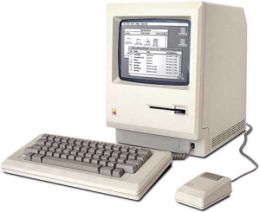When I wrote my not-so-complimentary piece on OpenOffice the other week, I expected to receive at least a few slams from fans and believers in the open source movement. And I did receive an interesting comment from a fellow who signed his name MnMKY, which I excerpt here:
The accomplishments of a worldwide effort, unifying multiple cultures and countries, is what OpenOffice.org represents. It is not a company sole bent on making money but on helping…
Microsoft has showed little innovation since the beginning days, no wait they took the concept of a graphic interface from someone else to. Microsoft was a great marketing agency; their best client, themselves. Bill Gates is the ultimate master…
OpenOffice.org deserves your talents unless you would rather sit on the bench and criticize and follow the the rest of the groupies. Innovation does not come from working in a bubble (MS OS, MS Products, MS Backend, MS tools) and neither does efficiency. Innovation comes from competition and not buying it.
This has brought up something that really sticks in my craw that I’ve been wanting to write about for a long time. So now I’m going to ramble about it for a while for your edification and entertainment. You have been warned.
 For some reason, all semblance of rationality goes out the door when techies talk about Microsoft. There are people out there who simply hate Microsoft. I’m not talking about people who just dislike Microsoft products; I’m talking about people who believe Bill Gates and Company are actually evil. Microsoft is throttling the open source movement! Microsoft is practicing mental slavery! Microsoft is an evil capitalist enterprise that seeks to dominate, control, and destroy!
For some reason, all semblance of rationality goes out the door when techies talk about Microsoft. There are people out there who simply hate Microsoft. I’m not talking about people who just dislike Microsoft products; I’m talking about people who believe Bill Gates and Company are actually evil. Microsoft is throttling the open source movement! Microsoft is practicing mental slavery! Microsoft is an evil capitalist enterprise that seeks to dominate, control, and destroy!
(A lot of people have had the same kind of irrational delusions about our last two presidents. These are the ones who don’t think it’s enough that George W. Bush is incompetent and has made really dangerous decisions for really bad reasons during his two terms in the White House. No, George Bush actually plotted to overthrow democracy by rigging the tragedies of 9/11! He’s sending your children to Iraq to die because he hates Muslims and wants to claim all their oil for his Texas cronies! On the right, these are the folks who believe that Bill and Hillary Clinton routinely murder their enemies, and then lob a few cruise missiles at random aspirin factories to distract us.)
I think part of the problem with the hardcore Microsoft haters is that many of them simply don’t understand business, or capitalism for that matter. It’s not for nothing that I compared the open source movement to socialism in a previous blog piece.
Here’s the thing: Microsoft is a business whose primary goal is not to help people, but to make a buck. And there’s nothing wrong with that. America is all about making a buck. The main reason this country was founded in the first place was not because the Americans had philosophical differences with the British monarchy, or because they wanted the right to freedom of speech and assembly. It’s because said monarchy was taxing the colonists to death and not giving them anything back for it.
(A side note: Paul Johnson in his often brilliant History of the American People traces the character of this country back to two primary groups. There were the Jamestown folks who settled in Virginia primarily to make money; and there were the Plymouth Rock folks who settled in Massachusetts largely for evangelical reasons. It’s a brilliant thesis. Money and religion: if you think about it, those words really do sum up the two sides of the American culture pretty well.) (Update 8/15/07: I should add the caveat that Mr. Johnson gets a wee bit cranky and reactionary when talking about the late 20th century. He believes JFK was just a playboy blowhard and Nixon should not have been impeached for Watergate.)
Not only is there nothing wrong with Microsoft being out to make a buck, but that’s what a corporation is for. And yet one of the nifty benefits of a business making a ton of money is that it does tend to help people. There are thousands of ordinary people who made millions of dollars by investing in Microsoft stock back in the ’80s when Bill Gates was just the richest dork in the world. Tens of thousands of people have built long, prosperous, stable careers from Microsoft paychecks. And Gates’ private foundation is already one of the most generous and successful non-profits in history; some people estimate that Bill and Melinda Gates’ efforts to make malaria drugs more affordable in third world countries have saved millions of lives. Millions of lives. That’s not trivial.
The other reason companies incorporate in the first place is for stability. Corporations are collective entities whose raison d’etre is to generate predictable revenue. If the CEO is a crook or a bum or simply ineffective — if he/she is no longer helping the majority of the company’s employees and/or stockholders — the CEO can be replaced. Yes, a corporation is the sum of its people, but it’s also more than that.
In other words: Microsoft’s primary function isn’t to innovate. It’s to minimize risk. Most people who buy Microsoft products usually acknowledge that they’re not getting the coolest, fastest, slickest software package around. People buy Microsoft products because: a) they tend to be good enough at doing what they’re designed to do, b) they’re relatively easy to use, c) they’re predictable, d) they’re pretty cheap, e) they’re ubiquitous and compatible with just about every piece of technology in the known universe.
When I go shopping for cars, I head straight for the Honda dealer. Why? Because my Honda Civic is the coolest car on the road? No, because Honda a known entity that will deliver a B+ product every time. It gives me an acceptable compromise in just about every area I care about. Those who love cars for cars’ sake don’t buy Honda Civics, they buy Porsches and Audi TT Coupes and Land Rovers. Me, I just want to get where I’m going in comfort and safety.
 Likewise Microsoft Word. It’s stuffed with crap I don’t need, but everyone in the universe can read its files. If I save a file in Microsoft Word format, I can be 90% certain that I’ll still be able to open it, read it, and use it 10 years from now, or even 20 years from now. I’m willing to lay down money that Word 2017 (or whatever web-based Microsoft service replaces it) will still be a solid B product.
Likewise Microsoft Word. It’s stuffed with crap I don’t need, but everyone in the universe can read its files. If I save a file in Microsoft Word format, I can be 90% certain that I’ll still be able to open it, read it, and use it 10 years from now, or even 20 years from now. I’m willing to lay down money that Word 2017 (or whatever web-based Microsoft service replaces it) will still be a solid B product.
And what about the question of innovation?
I believe that private enterprise is generally the engine that drives innovation, not well-intentioned groups of people looking to help. Of course, you’ll find plenty of people willing to argue this point, but private enterprise has a lot of evidence on its side. Yes, government dollars paid for the development of the ENIAC and the computer industry to begin with; but it was IBM and Apple who brought them to your house. Government dollars got the Internet off the ground; but the Internet was just a nice little academic cluster until America Online and Yahoo and Google et al came along.
And the notion that Microsoft doesn’t innovate is just patently untrue. The common conception in the tech world is that Microsoft buys up smaller, more innovative companies and technologies and then simply milks them for profit without lifting a finger to improve them. But just off the top of my head, I can think of a bunch of Microsoft innovations over the years:
- The mouse wheel
- The tilting mouse wheel
- On-the-fly spell checking
- Ergonomic keyboards
- Tablet PCs, handheld PCs, media center PCs, and pocket PCs
- Software wizards
- “Surface” computing
- ActiveX, VBScript, ASP, and .NET
- Proprietary HTML tags
- Windows taskbar
- Windows Sideshow
- Vista ReadyBoost
- NTFS and WinFS file systems
- Windows System Restore
- Zune squirting
I’m not saying these are all good innovations. I think the world could have done without ActiveX, for instance, and if the Antichrist has an MP3 player, it’s a Zune. But the point is that these are all examples of places where Microsoft did take some initiative. They created something new. Hell, for all the scorn heaped on Microsoft Bob over the years, it was a risky new product.
 The reason Microsoft isn’t known for making radical innovations is because they’re not very good at it. What they’re good at is bringing fringe innovations — whether their own or someone else’s — into the mainstream of computing.
The reason Microsoft isn’t known for making radical innovations is because they’re not very good at it. What they’re good at is bringing fringe innovations — whether their own or someone else’s — into the mainstream of computing.
Of course Microsoft isn’t generally the first to market. They don’t want to be. If fact, the recent upsurge of interest in OSX and Linux and open source products like Firefox is a godsend to Microsoft. Now they can sit back and wait for all the cutting-edge innovators to discover what works and what doesn’t, what people will pay for and what they won’t. Then they’ll jump into the market when they’re good and ready, find that sweet spot between functionality and convenience the customers are looking for, and charge full speed ahead. This is what they’ve always done. Bill Gates thanks all you Mac and Linux users for acting as his R&D lab.
Does Microsoft have anything to fear from the open source movement? Well, sure. But not nearly as much as you think. Linux still cleans Microsoft’s clock when it comes to server software, but on the desktop Microsoft does not worry about Linux. Exact numbers are hard to measure (and controversial when you do), but most people think Linux desktop users make up about 3% of the PC user base. Which is roughly the odds of Dennis Kucinich being sworn in as the next President of the United States come January 2009.
So where’s the pressure coming from these days if not the open source movement? Google. Apple. MySpace. Yahoo. Facebook. Sony. Nokia. And so on. All evil, greedy capitalist companies looking to make a buck.
Some people call Microsoft nothing more than a marketer and repackager. But what’s wrong with being a marketer and repackager? Do you think every single product in your household is the end result of some mad genius in a lab coming up with a brilliant idea that’s never been done before? Hardly. Henry Ford didn’t invent the automobile; he just figured out how to do it quicker and cheaper than anybody else had. Likewise Bill Gates didn’t invent the operating system or the software application; he just figured out how to turn them from obscure hobbies into mass-market phenomenons.
 (It’s interesting how few people have the same criticisms about Steve Jobs and Apple as they do about Bill Gates. I mean, Jobs didn’t invent the MP3 player, or the graphic operating system, or the all-in-one computer, or just about anything that Apple is known for. Everything people hail about the original Mac was borrowed from Xerox PARC. What Jobs did do is figure out a way to put it all in a slick, affordable, attractive package — and he deserves to be commended for it.)
(It’s interesting how few people have the same criticisms about Steve Jobs and Apple as they do about Bill Gates. I mean, Jobs didn’t invent the MP3 player, or the graphic operating system, or the all-in-one computer, or just about anything that Apple is known for. Everything people hail about the original Mac was borrowed from Xerox PARC. What Jobs did do is figure out a way to put it all in a slick, affordable, attractive package — and he deserves to be commended for it.)
My point in stating all this is not to fawn on Bill Gates’ feet and claim that the company he founded is above criticism. I just think that many people criticize Microsoft for the wrong reasons. They’re criticizing a Honda Accord because it’s not a BMW Z4 (the Mac) or one of those funky electric cars that gets 150 miles to the gallon (Linux).
Microsoft by and large achieves the goals it sets out for. But more than that, by and large they achieve their customers’ goals. Their products do generally get better as time goes on. Sometimes it takes a while, of course. (Think of the leaps they made from Windows 95 to Windows XP over just six years. Okay, so they haven’t exactly kept up the same pace with Vista, which is a rather troublesome development for them. But I say let’s see where things stand when Service Pack 1 comes out at the end of this year or beginning of next.)
So when you see someone who chooses to use Microsoft products instead of free open-source products, don’t whine that she’s a lemming or a corporate slave or an ignorant dumbass or a node in the Borg. Whether you like it or not, there are plenty of good reasons to buy and use Microsoft software.
***
(One last side note: The Microsoft/Borg comparison always cracks me up. It’s not like the Starship Enterprise was made up of independent thinkers using open source software on a ship built in some underground Mecca by a rebellious band of freedom-loving hackers led by Ice-T. Come on, you know the Enterprise was made by Boeing on some fat government contract. You know there was heavy support by corporate underwriting. You know that the crew members are just mouthing the platitudes that Starship Command told them to mouth, but the realities of the situation on Earth are much different than the pretty face we present to the aliens.)
***
(Okay, this is really the last side note: What’s Microsoft’s big Achilles’ heel? Security, security, security. They nailed the GUI, they nailed the first wave of the Internet [Update 8/15/07: okay, depends on how you define it, see my comment below], they nailed the Office productivity suite. But the rash of worms ‘n viruses ‘n such produced by insecure Windows 98 and Windows XP installations is the biggest challenge Microsoft has ever faced. I think they still have time to nail this one, and they’ve taken some good security steps with Windows Vista. But the clock’s a-tickin’. If you really want to destroy Microsoft, don’t bother with Linux. Write worms.)